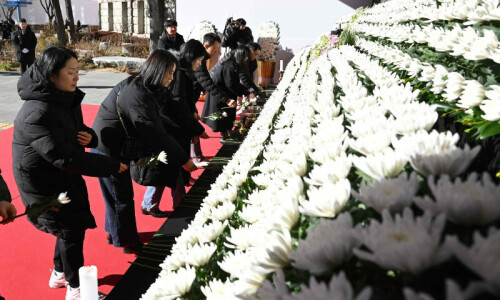KARACHI, April 29: While the price of petrol has been increased thrice in the last two months due to costly imports, Pakistan exported 7,500 tons and 7,150 tons of surplus petrol during March and February this year.
The refinery operators and the oil marketing companies link the petrol export to availability of surplus commodity in the country.
Pak Arab Refinery Company Limited (Parco) has been instrumental in export of petrol. It exported 300,000 tons of petrol in 2001-02 and earned $75 million at a price ranging between $235 and $260 per ton at that time.
From October 2006 till March 2008, Parco had exported 100,940 tons of petrol. However, the officials in Parco had never disclosed the earnings from petrol shipments.
On the import side, the state-run Pakistan State Oil (PSO) had imported 113,025 tons of petrol from October to December 2007 but the value of imports had not been mentioned.
The figures of both petrol imports and exports had been missing from the statistics posted at the website of Oil Companies Advisory Committee (OCAC).
The tenders issued by the PSO for petrol import were shared by two other oil marketing companies (OMCs). Sources said that the exchequer might have suffered a slight burden of $12-13 million depending on each cargo.
Pakistan Petroleum Dealers Association chairman Abdul Sami Khan said that the consumers, who are suffering from high petrol prices, should know at what price petrol has been exported and even the cost of import should also be mentioned.
He said it was true that the demand of local petrol had increased since smuggling of Iranian petrol dwindled sharply in Balochistan and other parts of the country since the rationing system last year for private cars aimed at reducing colossal state petrol subsidies.
However, the three time increase in price of local petrol might have attracted a number of people now involved in smuggling of Iranian petrol. Till last year, the Iranian petrol was selling at Rs40-45 per litre when the local petrol was at Rs54 per litre. Now the Iranian petrol is selling at Rs50-52 per litre and the local price of petrol is Rs65.81.
According to OCAC figures, the sale of petrol in March 2008 had surged to 120,941 tons as compared with 97,393 tons in the same month last year. In July-March 2007-08, petrol sales stood at 1.087 million tons as compared to 835,715 tons in the same period of last year.
Analyst at JS Global Farhan Mahmood was of the view that reduction in smuggling from Iran followed by declining gas availability and supply interruption of CNG during extreme winter this year also contributed to the growth of petrol sales.
He said local petrol demand was generally met through local refineries and a small quantity of petrol was imported due to shutdown in Parco.
A refinery operator said that Parco produces 65,000-70,000 tons of petrol every year followed by 25,000 tons by Pakistan Refinery Limited and National Refinery Limited, 25,000-30,000 tons by Attock Refinery and 7,000-8,000 tons by Bosicor.
He said that the export of surplus petrol was very negligible that would not make any difference even if its export was halted for providing any relief to the consumers. He added that per day consumption of petrol stands around at 4,000 tons, while monthly export had been 250 tons a day during February and March, 2008.
He said increase in production of motorcycles had also been creating new demand for petrol. Besides, many power generators are being run on petrol.













































Dear visitor, the comments section is undergoing an overhaul and will return soon.